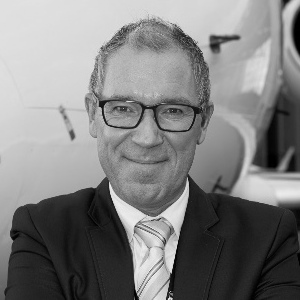
In ITIC’s latest Industry Insights interview, we speak with Volker Lemke, Head of the Ambulance Division and CSO of FAI Aviation Group, who gave us his thoughts on the aviation industry and the future for the air ambulance flight market as travel restrictions lift.
At a time when connecting face-to-face isn’t as simple as we are used to, we have been taking the opportunity to catch up with members of our ITIC community, to find out how they are navigating the current crisis. You can read our previous interviews with Eva Kluge, Dexter Tan, Carlos Salinas, Bettina Vadera, Women in Travel Insurance (WITI) Manjit Rana and Amy Villalobos.
Hi all. I hope that every one of the international insurance family is keeping well and safe during these times. I’m happy that I can contact you personally more or less this way. So now I can show you how the situation looks like with us.
Q: How have you adapted to WFH? Where are you today?
As you perhaps can see, I’m not in the home office, but actually in the company, even though we have sent staff home to work, the employees in the operational areas are here, including me.
Of course, the working atmosphere has changed due to all the requirements such as social distancing and hygienic measures. But day to day, business is still going on for us.
Lockdown in Germany has been, of course, an existential problem for many people. But so far, the state has been able to keep the situation under control with quick actions. Health system works, hospital capacities are very good, and the basic needs of the population have always worked. Of course, people now want to loosen the restrictions in order to return to normal, but that will only be allowed very slowly.
Q: How has the coronavirus pandemic impacted your products and services to date?
The general problem of the suffering aviation industry has clearly caught us too. So the majority of our Learjet fleet is on the ground. However, we fly all the more with our long-range planes that can avoid operation obstacles such as unauthorised crew overnight stays at many destinations worldwide.
And in addition, these aircraft offer also the possibility to use medical isolation units – what we need now. Of course, the purchase of these special devices and the training of the staff first confronted us with logistical tasks. In the meantime, however, we have flown over 20 missions. And so the whole effort was definitely worth it.
Q: What do you think the future of the travel industry will look like?
Even if we are currently lucky to receive enough orders, our forecast for the future is not exactly very positive. We probably have to assume that the travel insurance may only be able to reach its pre-corona size again in two or perhaps in three years only.
This would, of course, have the effect that the ambulance flight market would continue to exist only to a small extent, and that might force us to downsize the entire company in some areas. But who knows? People want to travel and maybe we’ll get back to the previous position much faster.
Q: What should the focus of travel insurance companies be in the immediate present?
At the beginning of the crisis, I expected our customers, especially the travel insurers, to understand the operational restrictions, and I have to say very clearly that this also happened. Of course, we have to explain many details and processes again and again, but the acceptance of the clients is generally high.
So, that gave you a brief impression of the situation with us. I very, very much hope that we can discuss these things again in person soon. Really very, very much hope that. And hopefully there is the ITIC Madrid that would simply be the perfect platform for it. Take care and hopefully see you soon again.

Volker Lemke – FAI
Stay connected and join our conversation
